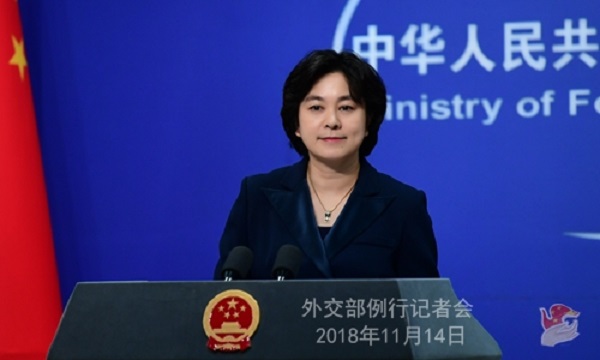Beijing, China on Tuesday sided with all-weather friend Pakistan in voicing “serious concern” over the Kashmir situation and stressed that Kashmir is “a legacy of history between India and Pakistan”.
It also said that New Delhi should avoid actions to “unilaterally change the status quo”, and termed the decision to reorganise Ladakh as a Union territory as “unacceptable”.
Foreign Ministry spokesperson Hua Chunying, in a written response on the tensions along the Line of Control and India’s move to abrogate Article 370 which gave special status to Jammu and Kashmir, said: “China is seriously concerned about the current situation in Kashmir.
“China’s position on the Kashmir issue is clear and consistent. This issue is a legacy of history between India and Pakistan, which is also the consensus of the international community.”
“The parties concerned should exercise restraint and act with caution, especially to avoid actions that unilaterally change the status quoAand exacerbate the tension,” she added.
She also termed the decision to reorganise Ladakh as a Union territory as “unacceptable”, saying the step was against its “territorial sovereignty” and asked India to “exercise caution” and not “complicate” the border issue.
“China has always objected to the Indian side drawing China’s territory in the western section of the China-India border into India’s administrative jurisdiction. This position is firm, consistent and has never changed in any way.
“In recent days, the Indian side has unilaterally modified its domestic laws in such a way as to continue to undermine China’s territorial sovereignty. This practice is unacceptable.
“We urge the Indian side to exercise caution on the border issue, to strictly abide by the relevant agreements reached between the two sides and to refrain from any move that would further complicate the border issue,” she said.
Beijing’s response echoes what Pakistan has maintained.
The Pakistan Foreign Office in a statement on Monday said that Kashmir is an “internationally recognized disputed territory”.
It said that “No unilateral step” by the Indian government can “change the disputed status”, according to the United Nations Security Council (UNSC) resolutions.
“Nor will this ever be acceptable to the people of Jammu & Kashmir and Pakistan” and that “as party to this international dispute, Pakistan will exercise all possible options to counter the illegal steps”.
India by revoking Article 370 has removed the special status of Kashmir and made it a Union Territory, with a legislative assembly.
Beijing’s response to the Kashmir issue comes ahead of External Affairs Minister S. Jaishankar’s three-day visit to China from August 11, to prepare for the second informal summit between Prime Minister Narendra Modi and Chinese President Xi Jinping in India in October.
China’s response is in contrast to that of the United States, which had taken a hands-off approach to India revoking Article 370.
The US said that it noted that New Delhi has described it as “strictly an internal matter”.
US State Department spokesperson Morgan Ortagus voiced concern over reports of the detention of some Kashmiri leaders, and urged “respect for individual rights” and talks with those affected.
The US also urged for peace and stability along the Line of Control.









